Law Society Assignment: Stare Decisis, Glorious Revolution, Common Law
VerifiedAdded on 2020/05/04
|13
|2518
|159
Essay
AI Summary
This law assignment explores several key legal concepts and historical events. It begins with an analysis of the doctrine of stare decisis, detailing its function, advantages, and limitations, including how judges may distinguish or overrule precedents. The assignment then examines the Glorious Revolution of 1688, its impact on English constitutional history, and the establishment of a constitutional monarchy. It further discusses the Common Law, its development through judge-made law, and the roles of legislative enactments and the Supreme Court. The assignment also touches upon Anglo-Saxon law, the Doomsday Book, Magna Carta, and the systems of writs, along with the role of the Lord Chancellor and the Chancery Jurisdiction. Finally, it covers the Rule of Law, separation of powers, representative court, responsible government and the Westminster System of court, all of which are fundamental to understanding the structure and function of legal systems.

Running head: LAW SOCIETY
Law Society
Name of the Student
Name of the University
Author Note
Law Society
Name of the Student
Name of the University
Author Note
Paraphrase This Document
Need a fresh take? Get an instant paraphrase of this document with our AI Paraphraser
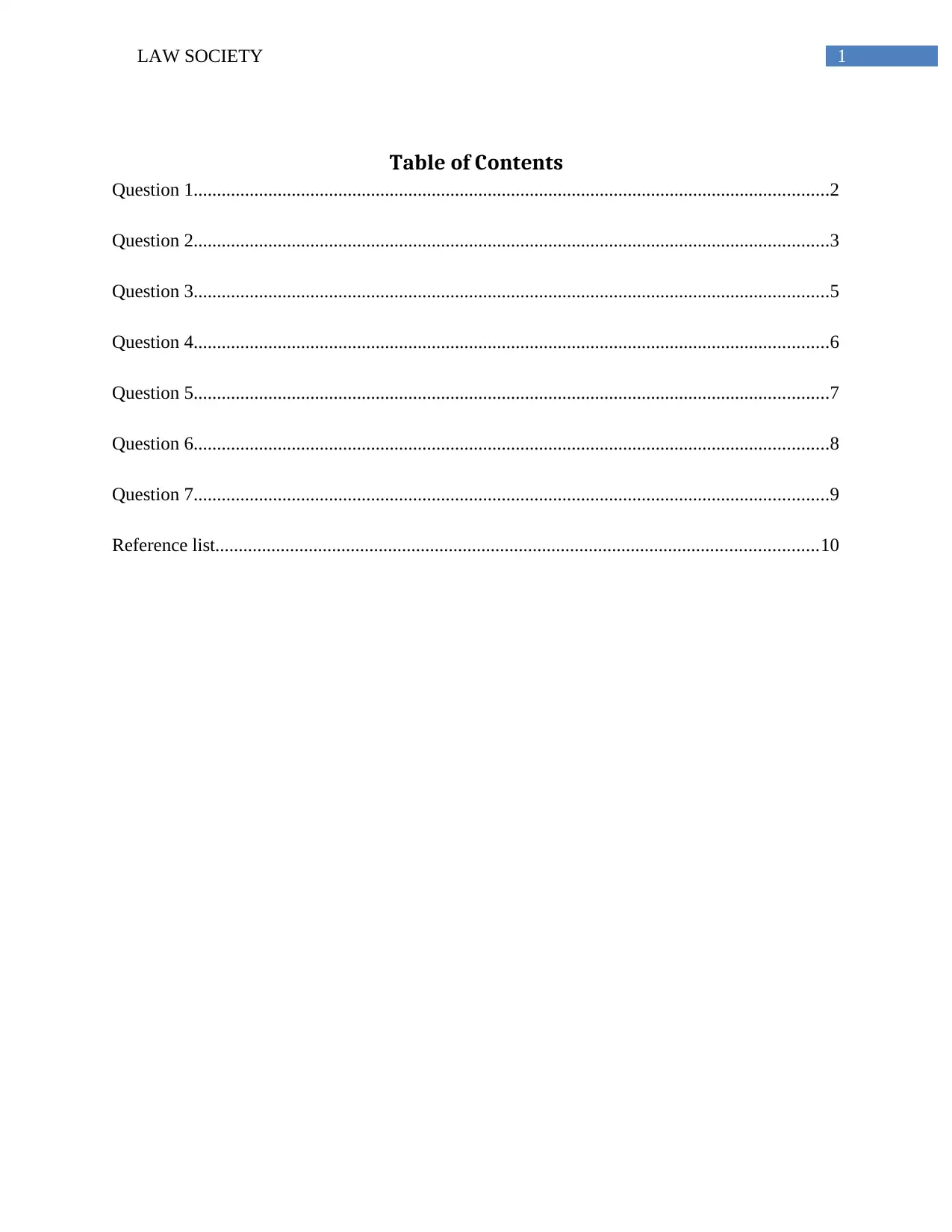
1LAW SOCIETY
Table of Contents
Question 1........................................................................................................................................2
Question 2........................................................................................................................................3
Question 3........................................................................................................................................5
Question 4........................................................................................................................................6
Question 5........................................................................................................................................7
Question 6........................................................................................................................................8
Question 7........................................................................................................................................9
Reference list.................................................................................................................................10
Table of Contents
Question 1........................................................................................................................................2
Question 2........................................................................................................................................3
Question 3........................................................................................................................................5
Question 4........................................................................................................................................6
Question 5........................................................................................................................................7
Question 6........................................................................................................................................8
Question 7........................................................................................................................................9
Reference list.................................................................................................................................10
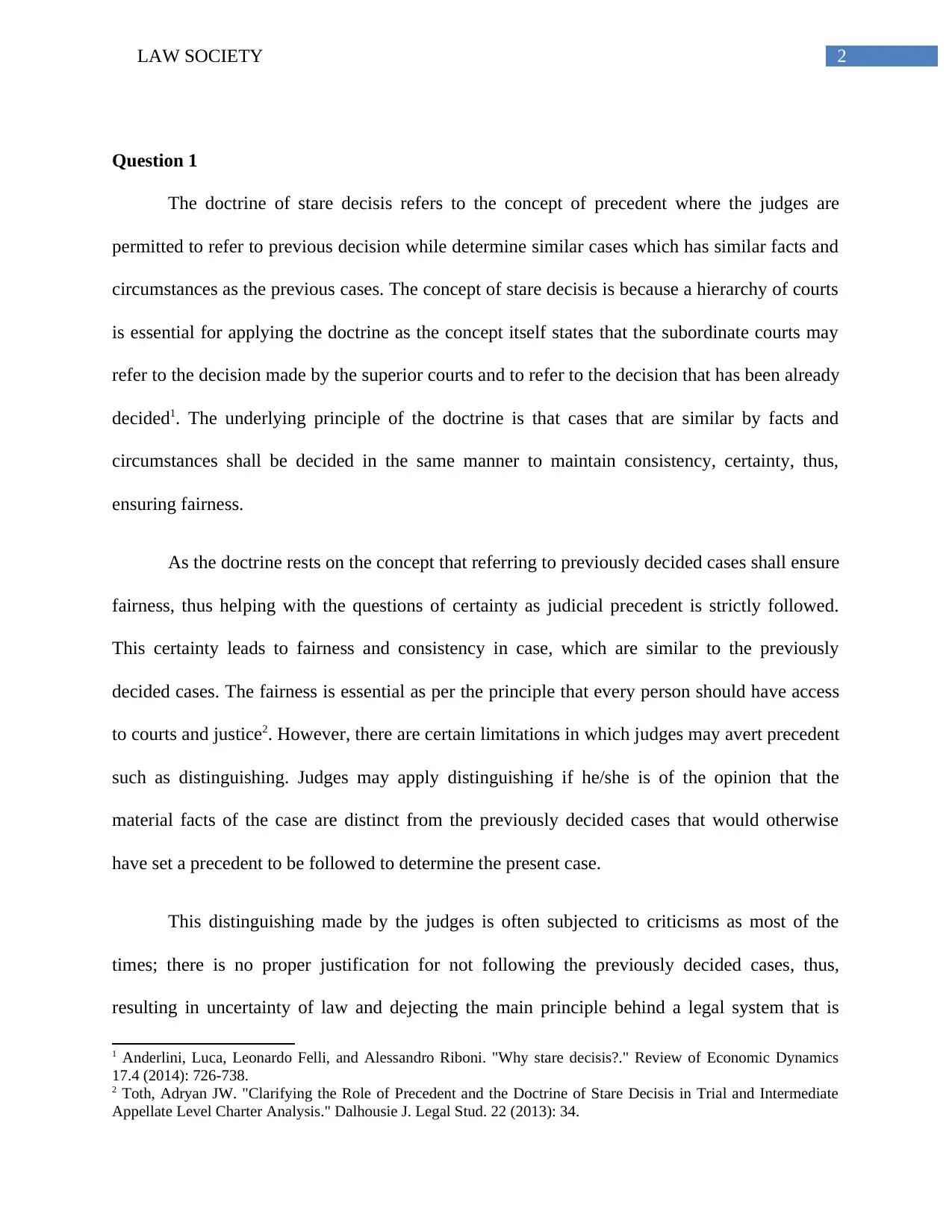
2LAW SOCIETY
Question 1
The doctrine of stare decisis refers to the concept of precedent where the judges are
permitted to refer to previous decision while determine similar cases which has similar facts and
circumstances as the previous cases. The concept of stare decisis is because a hierarchy of courts
is essential for applying the doctrine as the concept itself states that the subordinate courts may
refer to the decision made by the superior courts and to refer to the decision that has been already
decided1. The underlying principle of the doctrine is that cases that are similar by facts and
circumstances shall be decided in the same manner to maintain consistency, certainty, thus,
ensuring fairness.
As the doctrine rests on the concept that referring to previously decided cases shall ensure
fairness, thus helping with the questions of certainty as judicial precedent is strictly followed.
This certainty leads to fairness and consistency in case, which are similar to the previously
decided cases. The fairness is essential as per the principle that every person should have access
to courts and justice2. However, there are certain limitations in which judges may avert precedent
such as distinguishing. Judges may apply distinguishing if he/she is of the opinion that the
material facts of the case are distinct from the previously decided cases that would otherwise
have set a precedent to be followed to determine the present case.
This distinguishing made by the judges is often subjected to criticisms as most of the
times; there is no proper justification for not following the previously decided cases, thus,
resulting in uncertainty of law and dejecting the main principle behind a legal system that is
1 Anderlini, Luca, Leonardo Felli, and Alessandro Riboni. "Why stare decisis?." Review of Economic Dynamics
17.4 (2014): 726-738.
2 Toth, Adryan JW. "Clarifying the Role of Precedent and the Doctrine of Stare Decisis in Trial and Intermediate
Appellate Level Charter Analysis." Dalhousie J. Legal Stud. 22 (2013): 34.
Question 1
The doctrine of stare decisis refers to the concept of precedent where the judges are
permitted to refer to previous decision while determine similar cases which has similar facts and
circumstances as the previous cases. The concept of stare decisis is because a hierarchy of courts
is essential for applying the doctrine as the concept itself states that the subordinate courts may
refer to the decision made by the superior courts and to refer to the decision that has been already
decided1. The underlying principle of the doctrine is that cases that are similar by facts and
circumstances shall be decided in the same manner to maintain consistency, certainty, thus,
ensuring fairness.
As the doctrine rests on the concept that referring to previously decided cases shall ensure
fairness, thus helping with the questions of certainty as judicial precedent is strictly followed.
This certainty leads to fairness and consistency in case, which are similar to the previously
decided cases. The fairness is essential as per the principle that every person should have access
to courts and justice2. However, there are certain limitations in which judges may avert precedent
such as distinguishing. Judges may apply distinguishing if he/she is of the opinion that the
material facts of the case are distinct from the previously decided cases that would otherwise
have set a precedent to be followed to determine the present case.
This distinguishing made by the judges is often subjected to criticisms as most of the
times; there is no proper justification for not following the previously decided cases, thus,
resulting in uncertainty of law and dejecting the main principle behind a legal system that is
1 Anderlini, Luca, Leonardo Felli, and Alessandro Riboni. "Why stare decisis?." Review of Economic Dynamics
17.4 (2014): 726-738.
2 Toth, Adryan JW. "Clarifying the Role of Precedent and the Doctrine of Stare Decisis in Trial and Intermediate
Appellate Level Charter Analysis." Dalhousie J. Legal Stud. 22 (2013): 34.
⊘ This is a preview!⊘
Do you want full access?
Subscribe today to unlock all pages.

Trusted by 1+ million students worldwide
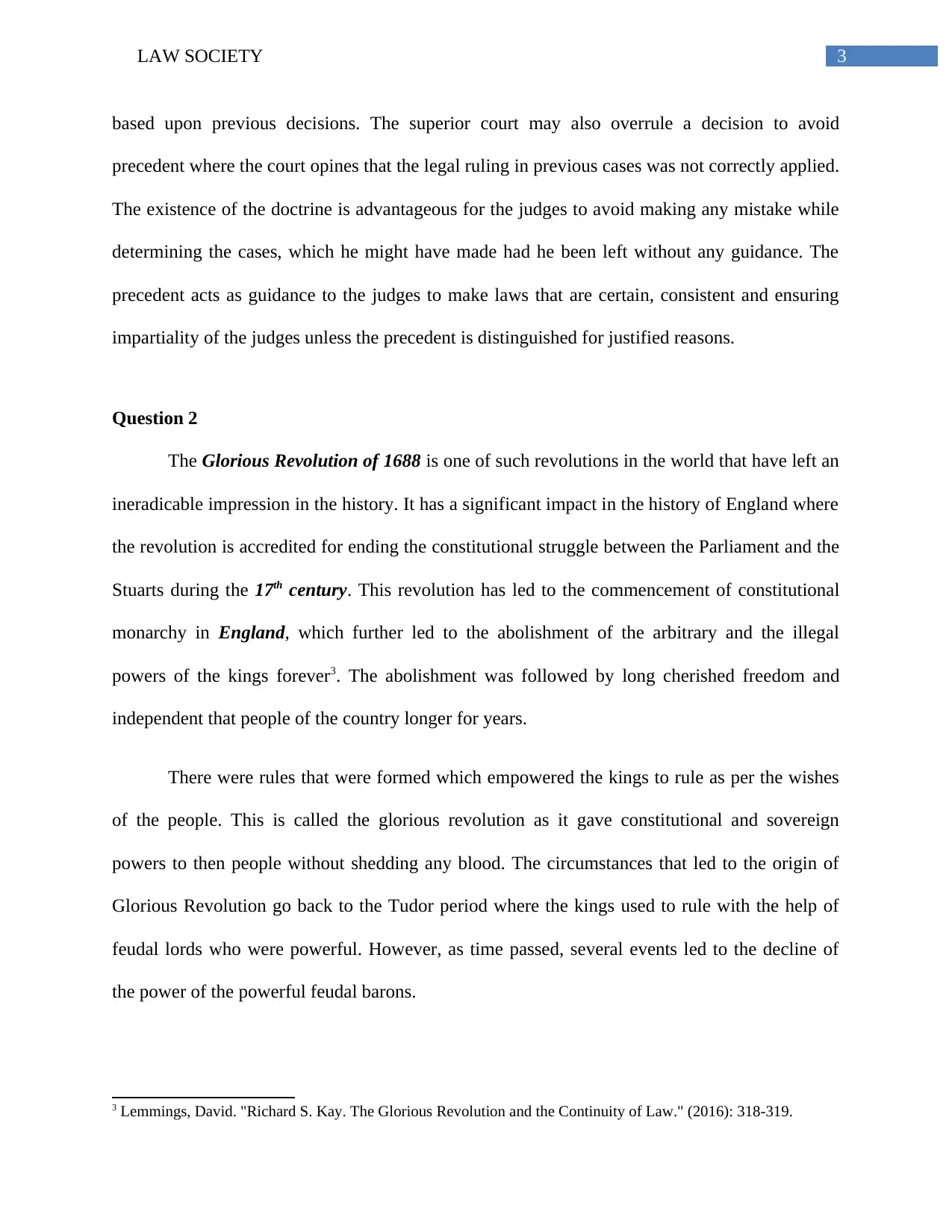
3LAW SOCIETY
based upon previous decisions. The superior court may also overrule a decision to avoid
precedent where the court opines that the legal ruling in previous cases was not correctly applied.
The existence of the doctrine is advantageous for the judges to avoid making any mistake while
determining the cases, which he might have made had he been left without any guidance. The
precedent acts as guidance to the judges to make laws that are certain, consistent and ensuring
impartiality of the judges unless the precedent is distinguished for justified reasons.
Question 2
The Glorious Revolution of 1688 is one of such revolutions in the world that have left an
ineradicable impression in the history. It has a significant impact in the history of England where
the revolution is accredited for ending the constitutional struggle between the Parliament and the
Stuarts during the 17th century. This revolution has led to the commencement of constitutional
monarchy in England, which further led to the abolishment of the arbitrary and the illegal
powers of the kings forever3. The abolishment was followed by long cherished freedom and
independent that people of the country longer for years.
There were rules that were formed which empowered the kings to rule as per the wishes
of the people. This is called the glorious revolution as it gave constitutional and sovereign
powers to then people without shedding any blood. The circumstances that led to the origin of
Glorious Revolution go back to the Tudor period where the kings used to rule with the help of
feudal lords who were powerful. However, as time passed, several events led to the decline of
the power of the powerful feudal barons.
3 Lemmings, David. "Richard S. Kay. The Glorious Revolution and the Continuity of Law." (2016): 318-319.
based upon previous decisions. The superior court may also overrule a decision to avoid
precedent where the court opines that the legal ruling in previous cases was not correctly applied.
The existence of the doctrine is advantageous for the judges to avoid making any mistake while
determining the cases, which he might have made had he been left without any guidance. The
precedent acts as guidance to the judges to make laws that are certain, consistent and ensuring
impartiality of the judges unless the precedent is distinguished for justified reasons.
Question 2
The Glorious Revolution of 1688 is one of such revolutions in the world that have left an
ineradicable impression in the history. It has a significant impact in the history of England where
the revolution is accredited for ending the constitutional struggle between the Parliament and the
Stuarts during the 17th century. This revolution has led to the commencement of constitutional
monarchy in England, which further led to the abolishment of the arbitrary and the illegal
powers of the kings forever3. The abolishment was followed by long cherished freedom and
independent that people of the country longer for years.
There were rules that were formed which empowered the kings to rule as per the wishes
of the people. This is called the glorious revolution as it gave constitutional and sovereign
powers to then people without shedding any blood. The circumstances that led to the origin of
Glorious Revolution go back to the Tudor period where the kings used to rule with the help of
feudal lords who were powerful. However, as time passed, several events led to the decline of
the power of the powerful feudal barons.
3 Lemmings, David. "Richard S. Kay. The Glorious Revolution and the Continuity of Law." (2016): 318-319.
Paraphrase This Document
Need a fresh take? Get an instant paraphrase of this document with our AI Paraphraser
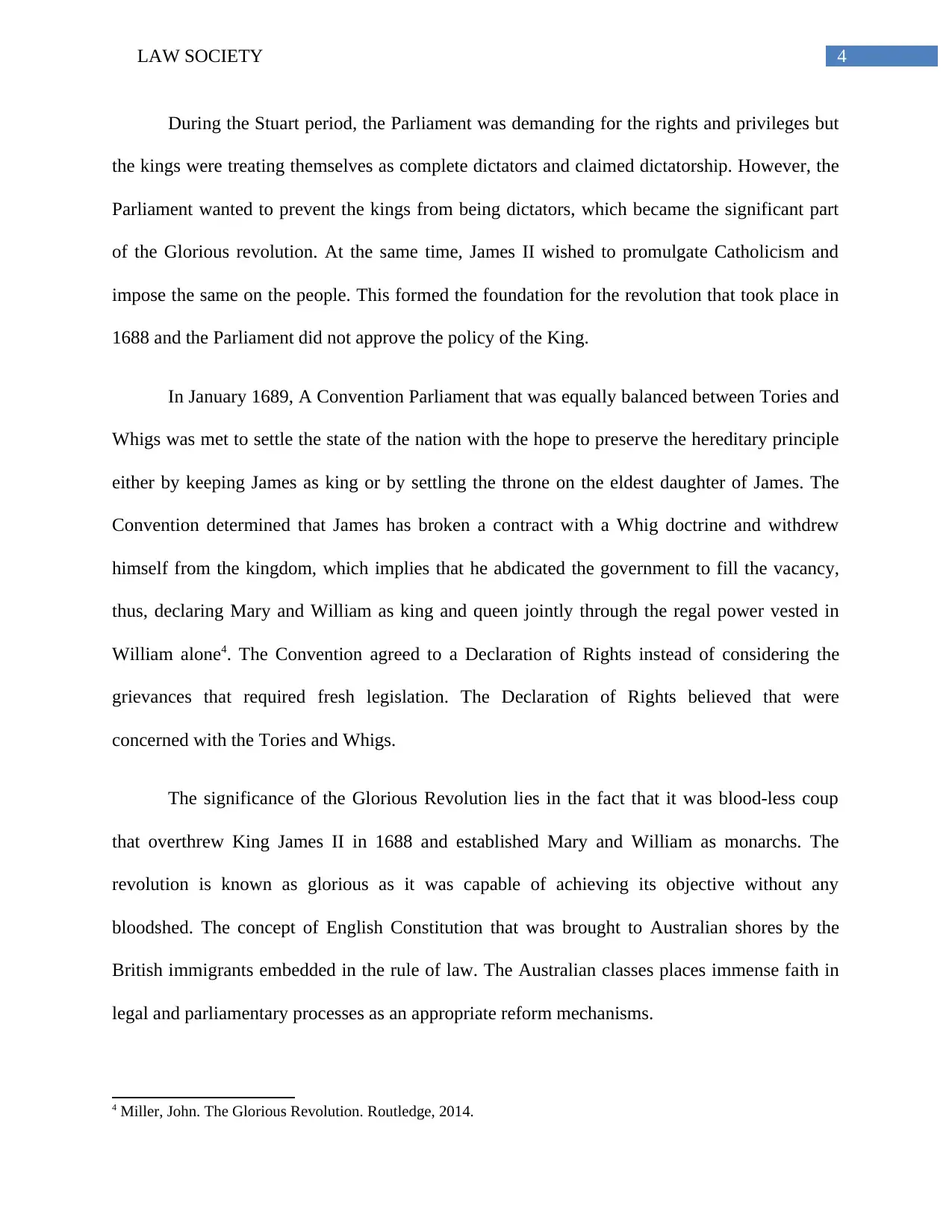
4LAW SOCIETY
During the Stuart period, the Parliament was demanding for the rights and privileges but
the kings were treating themselves as complete dictators and claimed dictatorship. However, the
Parliament wanted to prevent the kings from being dictators, which became the significant part
of the Glorious revolution. At the same time, James II wished to promulgate Catholicism and
impose the same on the people. This formed the foundation for the revolution that took place in
1688 and the Parliament did not approve the policy of the King.
In January 1689, A Convention Parliament that was equally balanced between Tories and
Whigs was met to settle the state of the nation with the hope to preserve the hereditary principle
either by keeping James as king or by settling the throne on the eldest daughter of James. The
Convention determined that James has broken a contract with a Whig doctrine and withdrew
himself from the kingdom, which implies that he abdicated the government to fill the vacancy,
thus, declaring Mary and William as king and queen jointly through the regal power vested in
William alone4. The Convention agreed to a Declaration of Rights instead of considering the
grievances that required fresh legislation. The Declaration of Rights believed that were
concerned with the Tories and Whigs.
The significance of the Glorious Revolution lies in the fact that it was blood-less coup
that overthrew King James II in 1688 and established Mary and William as monarchs. The
revolution is known as glorious as it was capable of achieving its objective without any
bloodshed. The concept of English Constitution that was brought to Australian shores by the
British immigrants embedded in the rule of law. The Australian classes places immense faith in
legal and parliamentary processes as an appropriate reform mechanisms.
4 Miller, John. The Glorious Revolution. Routledge, 2014.
During the Stuart period, the Parliament was demanding for the rights and privileges but
the kings were treating themselves as complete dictators and claimed dictatorship. However, the
Parliament wanted to prevent the kings from being dictators, which became the significant part
of the Glorious revolution. At the same time, James II wished to promulgate Catholicism and
impose the same on the people. This formed the foundation for the revolution that took place in
1688 and the Parliament did not approve the policy of the King.
In January 1689, A Convention Parliament that was equally balanced between Tories and
Whigs was met to settle the state of the nation with the hope to preserve the hereditary principle
either by keeping James as king or by settling the throne on the eldest daughter of James. The
Convention determined that James has broken a contract with a Whig doctrine and withdrew
himself from the kingdom, which implies that he abdicated the government to fill the vacancy,
thus, declaring Mary and William as king and queen jointly through the regal power vested in
William alone4. The Convention agreed to a Declaration of Rights instead of considering the
grievances that required fresh legislation. The Declaration of Rights believed that were
concerned with the Tories and Whigs.
The significance of the Glorious Revolution lies in the fact that it was blood-less coup
that overthrew King James II in 1688 and established Mary and William as monarchs. The
revolution is known as glorious as it was capable of achieving its objective without any
bloodshed. The concept of English Constitution that was brought to Australian shores by the
British immigrants embedded in the rule of law. The Australian classes places immense faith in
legal and parliamentary processes as an appropriate reform mechanisms.
4 Miller, John. The Glorious Revolution. Routledge, 2014.
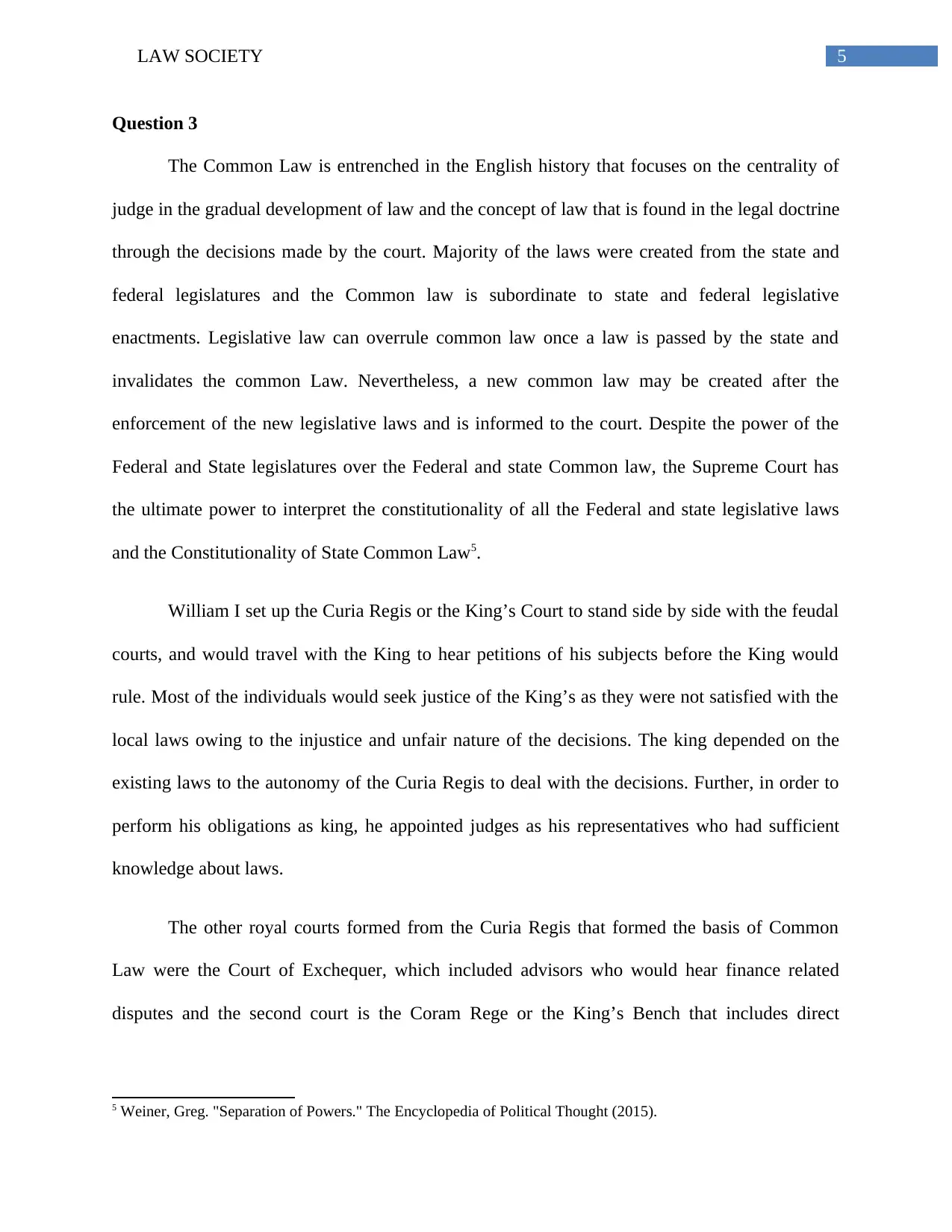
5LAW SOCIETY
Question 3
The Common Law is entrenched in the English history that focuses on the centrality of
judge in the gradual development of law and the concept of law that is found in the legal doctrine
through the decisions made by the court. Majority of the laws were created from the state and
federal legislatures and the Common law is subordinate to state and federal legislative
enactments. Legislative law can overrule common law once a law is passed by the state and
invalidates the common Law. Nevertheless, a new common law may be created after the
enforcement of the new legislative laws and is informed to the court. Despite the power of the
Federal and State legislatures over the Federal and state Common law, the Supreme Court has
the ultimate power to interpret the constitutionality of all the Federal and state legislative laws
and the Constitutionality of State Common Law5.
William I set up the Curia Regis or the King’s Court to stand side by side with the feudal
courts, and would travel with the King to hear petitions of his subjects before the King would
rule. Most of the individuals would seek justice of the King’s as they were not satisfied with the
local laws owing to the injustice and unfair nature of the decisions. The king depended on the
existing laws to the autonomy of the Curia Regis to deal with the decisions. Further, in order to
perform his obligations as king, he appointed judges as his representatives who had sufficient
knowledge about laws.
The other royal courts formed from the Curia Regis that formed the basis of Common
Law were the Court of Exchequer, which included advisors who would hear finance related
disputes and the second court is the Coram Rege or the King’s Bench that includes direct
5 Weiner, Greg. "Separation of Powers." The Encyclopedia of Political Thought (2015).
Question 3
The Common Law is entrenched in the English history that focuses on the centrality of
judge in the gradual development of law and the concept of law that is found in the legal doctrine
through the decisions made by the court. Majority of the laws were created from the state and
federal legislatures and the Common law is subordinate to state and federal legislative
enactments. Legislative law can overrule common law once a law is passed by the state and
invalidates the common Law. Nevertheless, a new common law may be created after the
enforcement of the new legislative laws and is informed to the court. Despite the power of the
Federal and State legislatures over the Federal and state Common law, the Supreme Court has
the ultimate power to interpret the constitutionality of all the Federal and state legislative laws
and the Constitutionality of State Common Law5.
William I set up the Curia Regis or the King’s Court to stand side by side with the feudal
courts, and would travel with the King to hear petitions of his subjects before the King would
rule. Most of the individuals would seek justice of the King’s as they were not satisfied with the
local laws owing to the injustice and unfair nature of the decisions. The king depended on the
existing laws to the autonomy of the Curia Regis to deal with the decisions. Further, in order to
perform his obligations as king, he appointed judges as his representatives who had sufficient
knowledge about laws.
The other royal courts formed from the Curia Regis that formed the basis of Common
Law were the Court of Exchequer, which included advisors who would hear finance related
disputes and the second court is the Coram Rege or the King’s Bench that includes direct
5 Weiner, Greg. "Separation of Powers." The Encyclopedia of Political Thought (2015).
⊘ This is a preview!⊘
Do you want full access?
Subscribe today to unlock all pages.

Trusted by 1+ million students worldwide
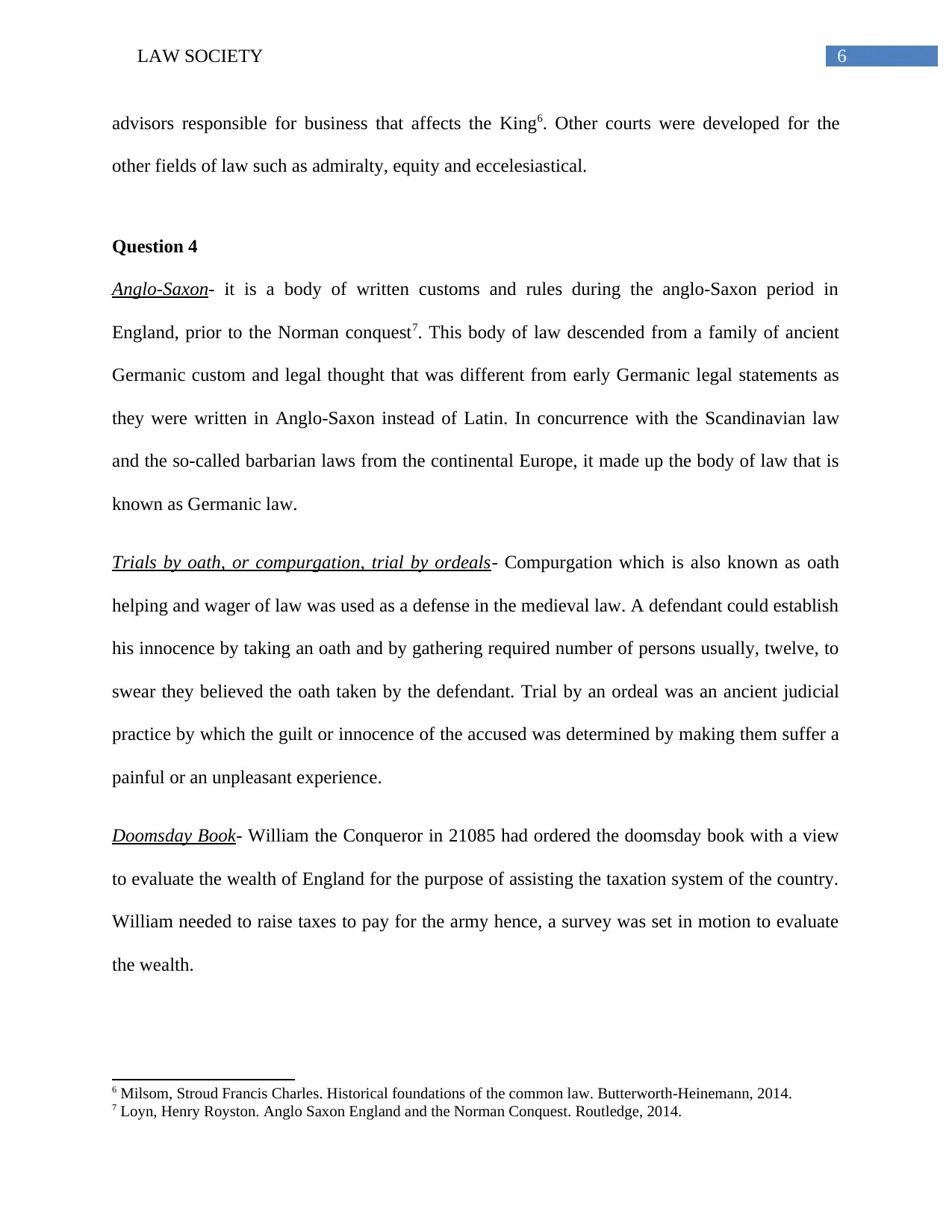
6LAW SOCIETY
advisors responsible for business that affects the King6. Other courts were developed for the
other fields of law such as admiralty, equity and eccelesiastical.
Question 4
Anglo-Saxon- it is a body of written customs and rules during the anglo-Saxon period in
England, prior to the Norman conquest7. This body of law descended from a family of ancient
Germanic custom and legal thought that was different from early Germanic legal statements as
they were written in Anglo-Saxon instead of Latin. In concurrence with the Scandinavian law
and the so-called barbarian laws from the continental Europe, it made up the body of law that is
known as Germanic law.
Trials by oath, or compurgation, trial by ordeals- Compurgation which is also known as oath
helping and wager of law was used as a defense in the medieval law. A defendant could establish
his innocence by taking an oath and by gathering required number of persons usually, twelve, to
swear they believed the oath taken by the defendant. Trial by an ordeal was an ancient judicial
practice by which the guilt or innocence of the accused was determined by making them suffer a
painful or an unpleasant experience.
Doomsday Book- William the Conqueror in 21085 had ordered the doomsday book with a view
to evaluate the wealth of England for the purpose of assisting the taxation system of the country.
William needed to raise taxes to pay for the army hence, a survey was set in motion to evaluate
the wealth.
6 Milsom, Stroud Francis Charles. Historical foundations of the common law. Butterworth-Heinemann, 2014.
7 Loyn, Henry Royston. Anglo Saxon England and the Norman Conquest. Routledge, 2014.
advisors responsible for business that affects the King6. Other courts were developed for the
other fields of law such as admiralty, equity and eccelesiastical.
Question 4
Anglo-Saxon- it is a body of written customs and rules during the anglo-Saxon period in
England, prior to the Norman conquest7. This body of law descended from a family of ancient
Germanic custom and legal thought that was different from early Germanic legal statements as
they were written in Anglo-Saxon instead of Latin. In concurrence with the Scandinavian law
and the so-called barbarian laws from the continental Europe, it made up the body of law that is
known as Germanic law.
Trials by oath, or compurgation, trial by ordeals- Compurgation which is also known as oath
helping and wager of law was used as a defense in the medieval law. A defendant could establish
his innocence by taking an oath and by gathering required number of persons usually, twelve, to
swear they believed the oath taken by the defendant. Trial by an ordeal was an ancient judicial
practice by which the guilt or innocence of the accused was determined by making them suffer a
painful or an unpleasant experience.
Doomsday Book- William the Conqueror in 21085 had ordered the doomsday book with a view
to evaluate the wealth of England for the purpose of assisting the taxation system of the country.
William needed to raise taxes to pay for the army hence, a survey was set in motion to evaluate
the wealth.
6 Milsom, Stroud Francis Charles. Historical foundations of the common law. Butterworth-Heinemann, 2014.
7 Loyn, Henry Royston. Anglo Saxon England and the Norman Conquest. Routledge, 2014.
Paraphrase This Document
Need a fresh take? Get an instant paraphrase of this document with our AI Paraphraser
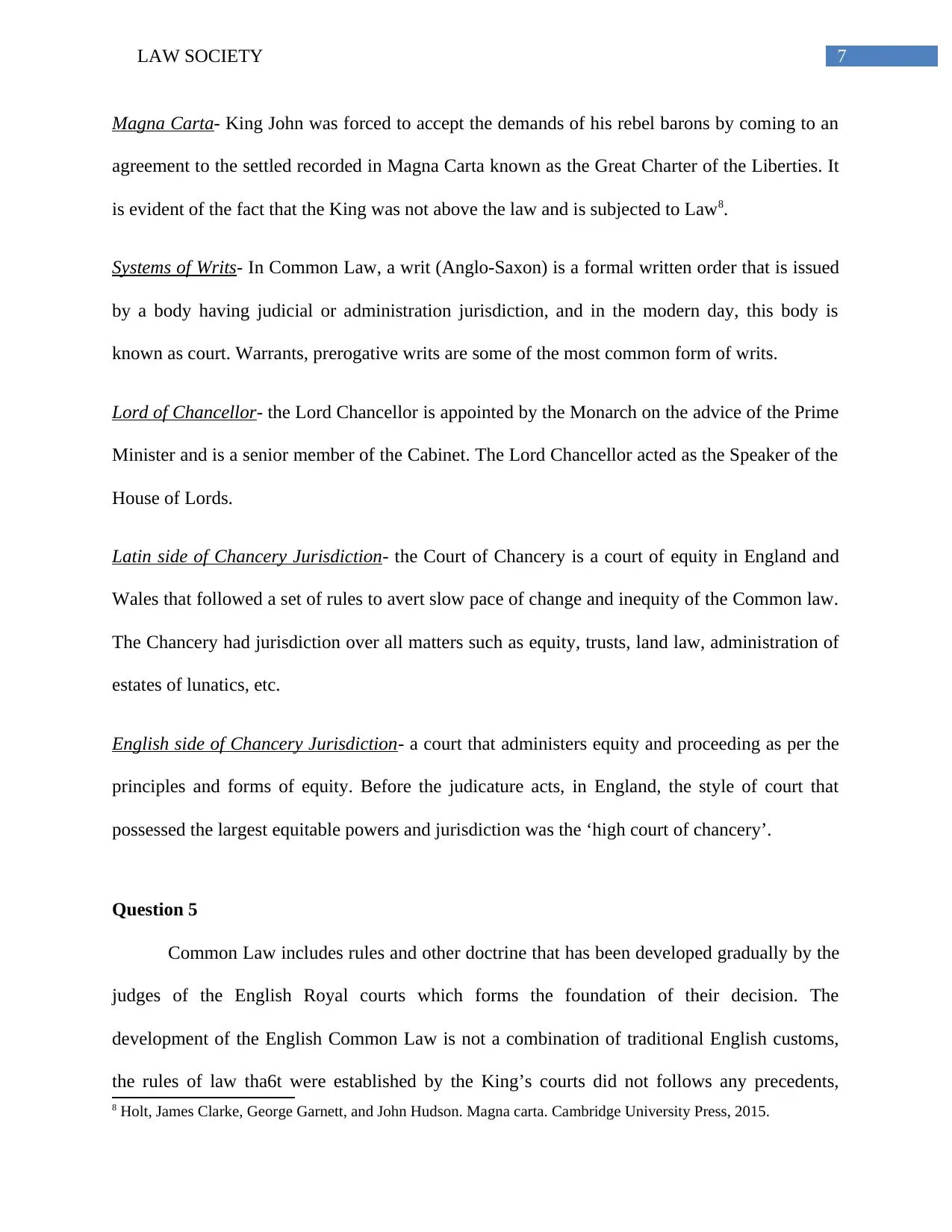
7LAW SOCIETY
Magna Carta- King John was forced to accept the demands of his rebel barons by coming to an
agreement to the settled recorded in Magna Carta known as the Great Charter of the Liberties. It
is evident of the fact that the King was not above the law and is subjected to Law8.
Systems of Writs- In Common Law, a writ (Anglo-Saxon) is a formal written order that is issued
by a body having judicial or administration jurisdiction, and in the modern day, this body is
known as court. Warrants, prerogative writs are some of the most common form of writs.
Lord of Chancellor- the Lord Chancellor is appointed by the Monarch on the advice of the Prime
Minister and is a senior member of the Cabinet. The Lord Chancellor acted as the Speaker of the
House of Lords.
Latin side of Chancery Jurisdiction- the Court of Chancery is a court of equity in England and
Wales that followed a set of rules to avert slow pace of change and inequity of the Common law.
The Chancery had jurisdiction over all matters such as equity, trusts, land law, administration of
estates of lunatics, etc.
English side of Chancery Jurisdiction- a court that administers equity and proceeding as per the
principles and forms of equity. Before the judicature acts, in England, the style of court that
possessed the largest equitable powers and jurisdiction was the ‘high court of chancery’.
Question 5
Common Law includes rules and other doctrine that has been developed gradually by the
judges of the English Royal courts which forms the foundation of their decision. The
development of the English Common Law is not a combination of traditional English customs,
the rules of law tha6t were established by the King’s courts did not follows any precedents,
8 Holt, James Clarke, George Garnett, and John Hudson. Magna carta. Cambridge University Press, 2015.
Magna Carta- King John was forced to accept the demands of his rebel barons by coming to an
agreement to the settled recorded in Magna Carta known as the Great Charter of the Liberties. It
is evident of the fact that the King was not above the law and is subjected to Law8.
Systems of Writs- In Common Law, a writ (Anglo-Saxon) is a formal written order that is issued
by a body having judicial or administration jurisdiction, and in the modern day, this body is
known as court. Warrants, prerogative writs are some of the most common form of writs.
Lord of Chancellor- the Lord Chancellor is appointed by the Monarch on the advice of the Prime
Minister and is a senior member of the Cabinet. The Lord Chancellor acted as the Speaker of the
House of Lords.
Latin side of Chancery Jurisdiction- the Court of Chancery is a court of equity in England and
Wales that followed a set of rules to avert slow pace of change and inequity of the Common law.
The Chancery had jurisdiction over all matters such as equity, trusts, land law, administration of
estates of lunatics, etc.
English side of Chancery Jurisdiction- a court that administers equity and proceeding as per the
principles and forms of equity. Before the judicature acts, in England, the style of court that
possessed the largest equitable powers and jurisdiction was the ‘high court of chancery’.
Question 5
Common Law includes rules and other doctrine that has been developed gradually by the
judges of the English Royal courts which forms the foundation of their decision. The
development of the English Common Law is not a combination of traditional English customs,
the rules of law tha6t were established by the King’s courts did not follows any precedents,
8 Holt, James Clarke, George Garnett, and John Hudson. Magna carta. Cambridge University Press, 2015.

8LAW SOCIETY
hence reflecting by-product of an administrative triumph. In order to eliminate variation arising
from local customs, the Common law gave rise to the concept of justice. This concept included
the doctrine of stare decisis that emphasizes on the significance of legal precedents that were
established in formerly established cases.
Question 6
Rule of Law- the rule of law is the legal principle, which states that law should govern
the nation in contrary to individuals’ government officials governing the nation. It is a general
constitutional principle that aims at restraining the abuse of official power and safeguards civil
rights of the citizens from being interfered by official power.
Separation of powers – the government is separated into three essential branches judiciary,
legislature and executive in order to enable the government to function effectively. The three
separate branches are to function independently without any interference9.
Representative Court- a person has a right to speak on his own behalf without a solicitor or
other legal professional under circumstances when the laymen is incapable of affording any
solicitor or advocate.
Responsible Government- It is a conception of a governmental system that encompasses the
parliamentary principle of accountability, which forms the foundation of the Westminster system
of Parliamentary democracy.
Westminster System of court – It is a parliamentary system of government which includes series
of procedure operating legislature. The government has three separate branches such as the
9 Bellamy, Richard, ed. The rule of law and the separation of powers. Routledge, 2017.
hence reflecting by-product of an administrative triumph. In order to eliminate variation arising
from local customs, the Common law gave rise to the concept of justice. This concept included
the doctrine of stare decisis that emphasizes on the significance of legal precedents that were
established in formerly established cases.
Question 6
Rule of Law- the rule of law is the legal principle, which states that law should govern
the nation in contrary to individuals’ government officials governing the nation. It is a general
constitutional principle that aims at restraining the abuse of official power and safeguards civil
rights of the citizens from being interfered by official power.
Separation of powers – the government is separated into three essential branches judiciary,
legislature and executive in order to enable the government to function effectively. The three
separate branches are to function independently without any interference9.
Representative Court- a person has a right to speak on his own behalf without a solicitor or
other legal professional under circumstances when the laymen is incapable of affording any
solicitor or advocate.
Responsible Government- It is a conception of a governmental system that encompasses the
parliamentary principle of accountability, which forms the foundation of the Westminster system
of Parliamentary democracy.
Westminster System of court – It is a parliamentary system of government which includes series
of procedure operating legislature. The government has three separate branches such as the
9 Bellamy, Richard, ed. The rule of law and the separation of powers. Routledge, 2017.
⊘ This is a preview!⊘
Do you want full access?
Subscribe today to unlock all pages.

Trusted by 1+ million students worldwide
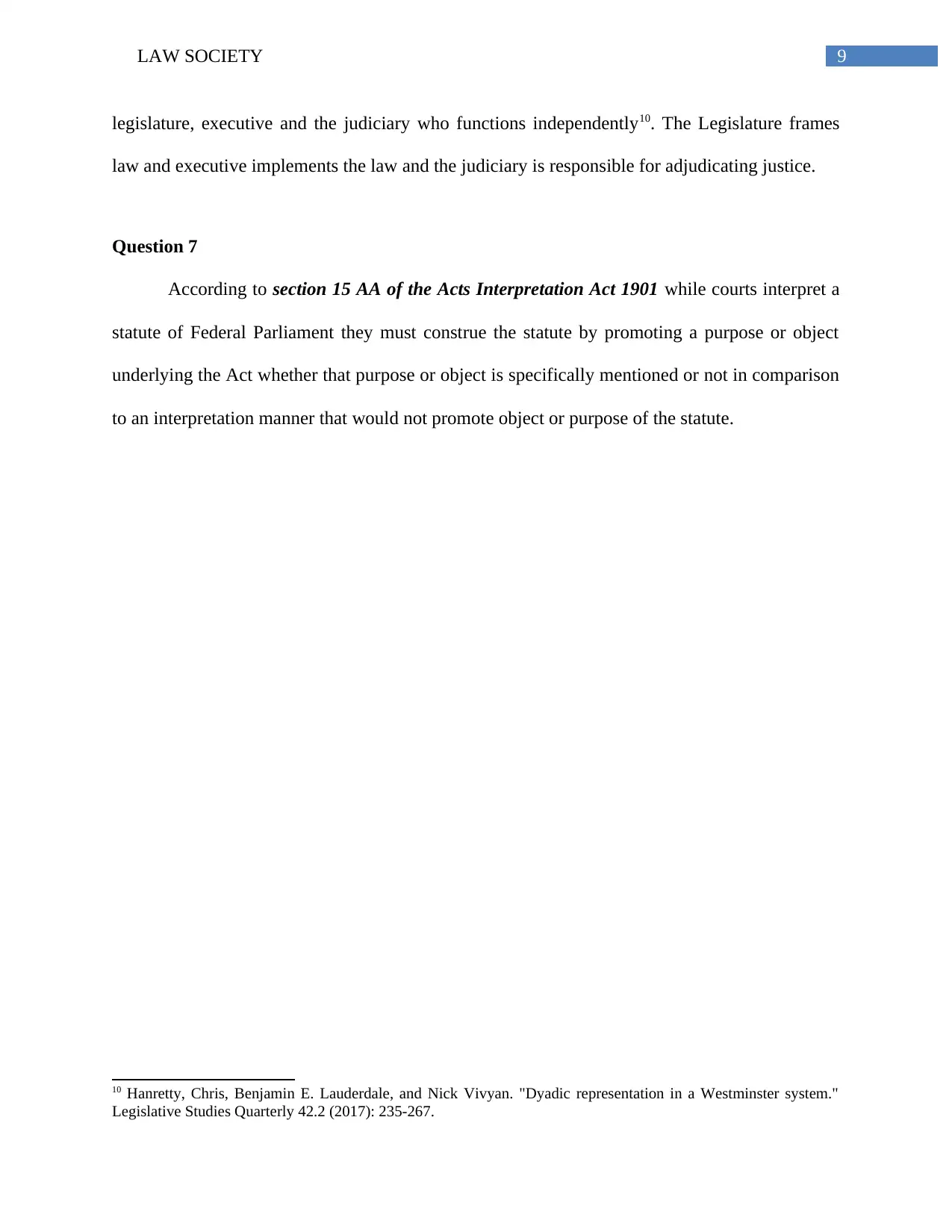
9LAW SOCIETY
legislature, executive and the judiciary who functions independently10. The Legislature frames
law and executive implements the law and the judiciary is responsible for adjudicating justice.
Question 7
According to section 15 AA of the Acts Interpretation Act 1901 while courts interpret a
statute of Federal Parliament they must construe the statute by promoting a purpose or object
underlying the Act whether that purpose or object is specifically mentioned or not in comparison
to an interpretation manner that would not promote object or purpose of the statute.
10 Hanretty, Chris, Benjamin E. Lauderdale, and Nick Vivyan. "Dyadic representation in a Westminster system."
Legislative Studies Quarterly 42.2 (2017): 235-267.
legislature, executive and the judiciary who functions independently10. The Legislature frames
law and executive implements the law and the judiciary is responsible for adjudicating justice.
Question 7
According to section 15 AA of the Acts Interpretation Act 1901 while courts interpret a
statute of Federal Parliament they must construe the statute by promoting a purpose or object
underlying the Act whether that purpose or object is specifically mentioned or not in comparison
to an interpretation manner that would not promote object or purpose of the statute.
10 Hanretty, Chris, Benjamin E. Lauderdale, and Nick Vivyan. "Dyadic representation in a Westminster system."
Legislative Studies Quarterly 42.2 (2017): 235-267.
Paraphrase This Document
Need a fresh take? Get an instant paraphrase of this document with our AI Paraphraser
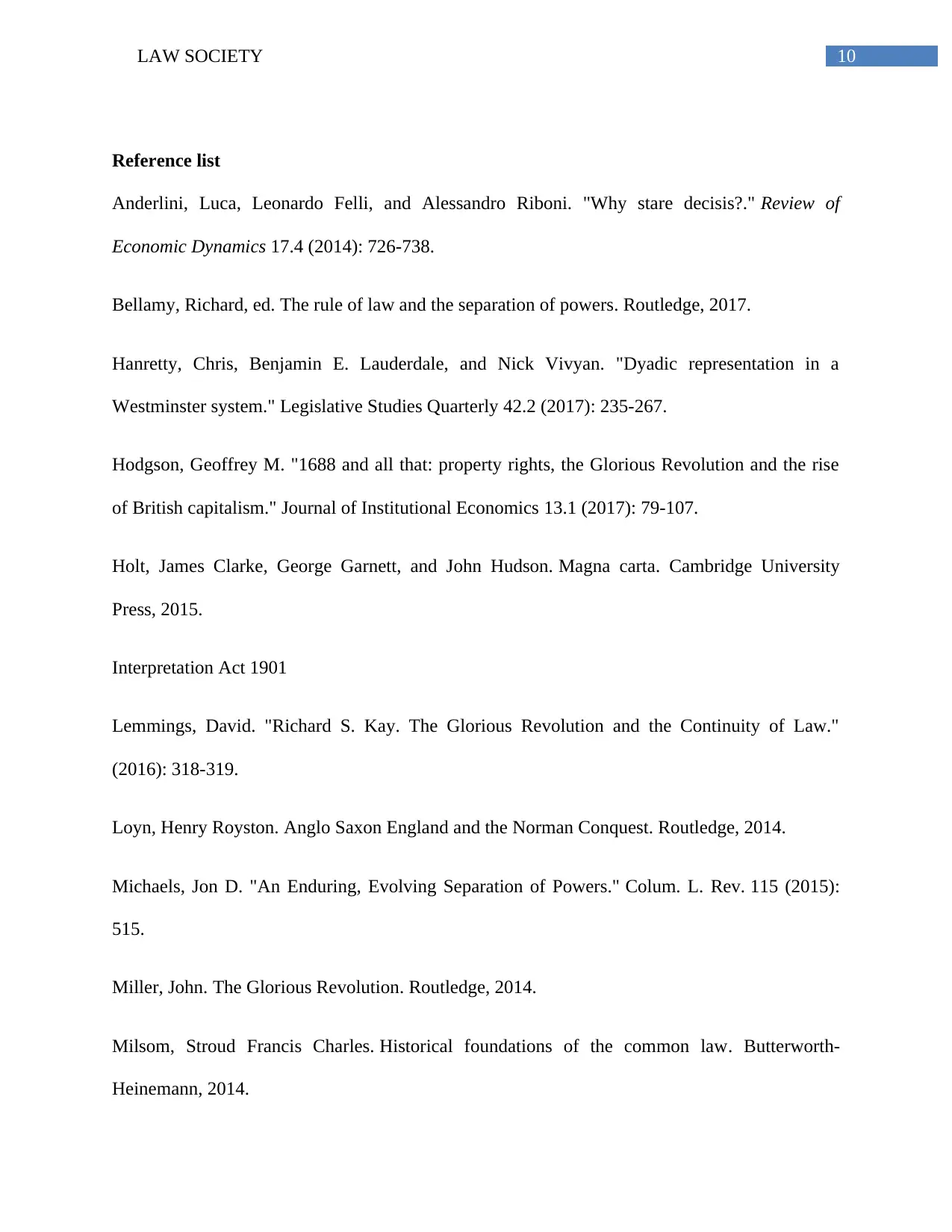
10LAW SOCIETY
Reference list
Anderlini, Luca, Leonardo Felli, and Alessandro Riboni. "Why stare decisis?." Review of
Economic Dynamics 17.4 (2014): 726-738.
Bellamy, Richard, ed. The rule of law and the separation of powers. Routledge, 2017.
Hanretty, Chris, Benjamin E. Lauderdale, and Nick Vivyan. "Dyadic representation in a
Westminster system." Legislative Studies Quarterly 42.2 (2017): 235-267.
Hodgson, Geoffrey M. "1688 and all that: property rights, the Glorious Revolution and the rise
of British capitalism." Journal of Institutional Economics 13.1 (2017): 79-107.
Holt, James Clarke, George Garnett, and John Hudson. Magna carta. Cambridge University
Press, 2015.
Interpretation Act 1901
Lemmings, David. "Richard S. Kay. The Glorious Revolution and the Continuity of Law."
(2016): 318-319.
Loyn, Henry Royston. Anglo Saxon England and the Norman Conquest. Routledge, 2014.
Michaels, Jon D. "An Enduring, Evolving Separation of Powers." Colum. L. Rev. 115 (2015):
515.
Miller, John. The Glorious Revolution. Routledge, 2014.
Milsom, Stroud Francis Charles. Historical foundations of the common law. Butterworth-
Heinemann, 2014.
Reference list
Anderlini, Luca, Leonardo Felli, and Alessandro Riboni. "Why stare decisis?." Review of
Economic Dynamics 17.4 (2014): 726-738.
Bellamy, Richard, ed. The rule of law and the separation of powers. Routledge, 2017.
Hanretty, Chris, Benjamin E. Lauderdale, and Nick Vivyan. "Dyadic representation in a
Westminster system." Legislative Studies Quarterly 42.2 (2017): 235-267.
Hodgson, Geoffrey M. "1688 and all that: property rights, the Glorious Revolution and the rise
of British capitalism." Journal of Institutional Economics 13.1 (2017): 79-107.
Holt, James Clarke, George Garnett, and John Hudson. Magna carta. Cambridge University
Press, 2015.
Interpretation Act 1901
Lemmings, David. "Richard S. Kay. The Glorious Revolution and the Continuity of Law."
(2016): 318-319.
Loyn, Henry Royston. Anglo Saxon England and the Norman Conquest. Routledge, 2014.
Michaels, Jon D. "An Enduring, Evolving Separation of Powers." Colum. L. Rev. 115 (2015):
515.
Miller, John. The Glorious Revolution. Routledge, 2014.
Milsom, Stroud Francis Charles. Historical foundations of the common law. Butterworth-
Heinemann, 2014.
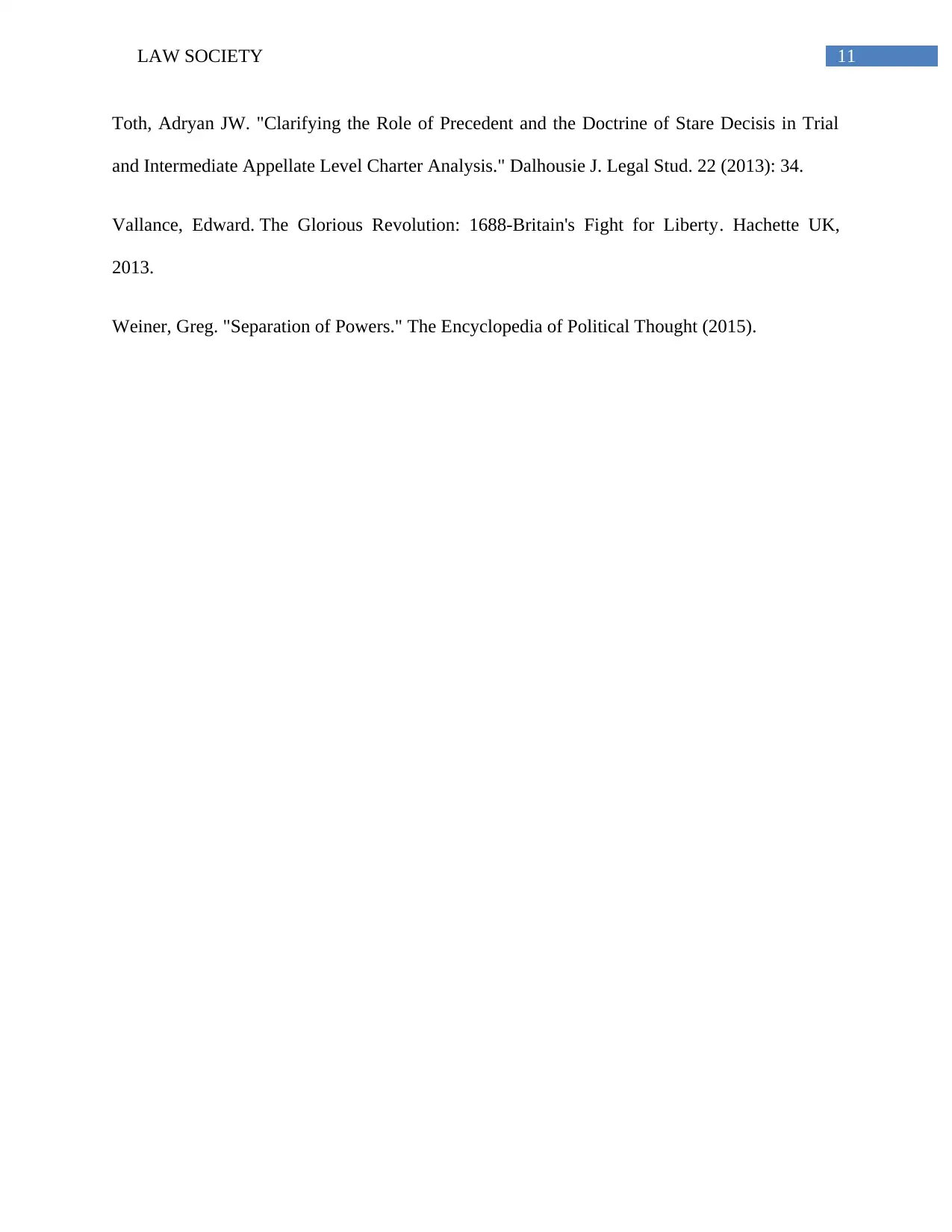
11LAW SOCIETY
Toth, Adryan JW. "Clarifying the Role of Precedent and the Doctrine of Stare Decisis in Trial
and Intermediate Appellate Level Charter Analysis." Dalhousie J. Legal Stud. 22 (2013): 34.
Vallance, Edward. The Glorious Revolution: 1688-Britain's Fight for Liberty. Hachette UK,
2013.
Weiner, Greg. "Separation of Powers." The Encyclopedia of Political Thought (2015).
Toth, Adryan JW. "Clarifying the Role of Precedent and the Doctrine of Stare Decisis in Trial
and Intermediate Appellate Level Charter Analysis." Dalhousie J. Legal Stud. 22 (2013): 34.
Vallance, Edward. The Glorious Revolution: 1688-Britain's Fight for Liberty. Hachette UK,
2013.
Weiner, Greg. "Separation of Powers." The Encyclopedia of Political Thought (2015).
⊘ This is a preview!⊘
Do you want full access?
Subscribe today to unlock all pages.

Trusted by 1+ million students worldwide
1 out of 13
Related Documents
Your All-in-One AI-Powered Toolkit for Academic Success.
+13062052269
info@desklib.com
Available 24*7 on WhatsApp / Email
![[object Object]](/_next/static/media/star-bottom.7253800d.svg)
Unlock your academic potential
Copyright © 2020–2026 A2Z Services. All Rights Reserved. Developed and managed by ZUCOL.





